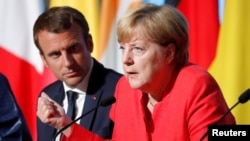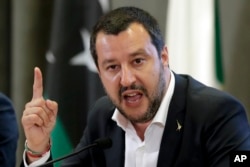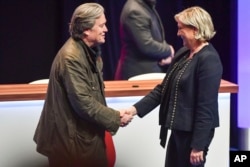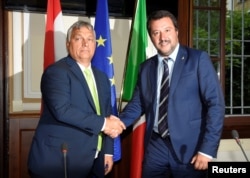German Chancellor Angela Merkel counsels her ministers to read “The Sleepwalkers: How Europe Went to War in 1914,” a riveting study examining the causes of World War I and the political failures which contributed to the calamity.
Nineteen-fourteen is different from 2018 in many regards, but what haunts Merkel and others who look back is that the run-up to World War I saw the emergence of “big man politics” and the menacing build-up of nationalism as well as the advancing of nativist projects by various leaders trying to knit together their own disparate regions or to ride surges in public chauvinism.
Geo-strategic stability and predictability gave way. Politicians made major miscalculations. The author of The Sleepwalkers, historian Christopher Munro Clark, notes “Since the end of the Cold War, a system of global bipolar stability has made way for a more complex and unpredictable array of forces, including declining empires and rising powers — a state of affairs that invites comparison with the Europe of 1914.”
Comparisons to 1914 draw derision from Europe’s nativist leaders, who accuse their opponents of being alarmist.
Her choice of book is instructive — it speaks to the the fear now haunting centrists and liberals that the rise of Europe’s populist nationalists, fed by an apparently insoluble migration crisis, is marking a possible end-of-era moment.
But led by France’s Emmanuel Macron, the continent’s pro-EU centrists are trying to restore stability and predictability in the face of mounting political uncertainty and rising nativism.
Opposed to them is a bloc of nativist leaders, with Italy’s Matteo Salvini to the fore, which is busy fashioning battle plans for next year’s European Union parliamentary elections. They have turned for advice to former Donald Trump aide Steve Bannon.
The opposing camps are intent on framing the coming electoral contest as a defining moment for a multinational bloc buffeted by a toxic migration crisis, economic inequality, and a resurgent, goading Russia that has helped to fund maverick anti-EU parties on both the left and right of the political spectrum. At the same time across the Atlantic, President Donald Trump has shown increasing ambivalence about alliance with a bloc Washington helped form.
Identity is at the center of the coming electoral fight, and the first serious skirmish will come in the Austrian city of Salzburg where EU leaders are scheduled to meet beginning September 19 for a two-day summit to discuss, once again, Brexit and how to handle migrants as a bloc. The leaders will disagree on the two main issues on the formal agenda, reflecting starkly opposed visions of Europe.
At Salzburg, Macron will market his ideas for reform and revival, arguing for greater political and economic integration. The nationalists want a brake on further integration as part of their vision of the bloc reversing course to become a looser grouping of nation states, all of whom would be freer from Brussels and less hedged in by EU treaties.
The key champions in the struggle for mastery between liberalism and nationalism sparred last week in a war of words, giving a flavor of the electoral contest to come. Salvini and Hungarian Prime Minister Viktor Orban midweek launched an anti-migration manifesto, naming Macron as their main adversary.
“There are currently two camps in Europe and one is headed by Macron,’ Orban said, who sought to portray the French leader as pro-immigration, arguing, he is “the leader of those parties who back migration to Europe, and on the other side there’s us who want to stop illegal migration.”
Throughout the week, the French leader pushed his case for ambitious reforms, some supported by Germany and others not, that would boost EU integration — an antidote, as he sees it, to what he calls the illiberal democracies of Orban and other autocratic-minded nationalists who, he argues, are simplifying the migration crisis to stoke nativist anger.
Macron mocked nationalist leaders for accepting development aid from the bloc, while disdaining the EU. “I will give no ground to nationalists and those who spread words of hate. If they want to see me as their main opponent, they're right,” he retorted while on a trip to Copenhagen.
In a bid to reconcile the idea of greater European integration with flexibility for national governments, Macron has prepared to reintroduce the policy ideas of his chief economic adviser, Jean Pisani-Ferry. In a lengthy 2016 policy paper for Bruegel, a think tank in Brussels, Macron’s aide argued the EU should use Brexit, and other major disputes over EU spending rules, as a chance to re-shape what he calls a “Europe of two circles,” with the EU at its core and an outer circle of countries in a structured partnership.
“The governance of the eurozone remains excessively cumbersome and technocratic,” Pisani-Ferry said recently. Macron aides say the French leader will use the Salzburg summit as a platform to market a vision of the bloc as a series of “concentric circles” with member states and near neighbors able to move at their own pace — a bid, his aides say, to create the breathing space to allow the nativist wave to ebb and to reestablish a sense of common purpose and identity in a bloc currently so at odds with itself.
But EU federalists fear ‘flexible governance’ will merely empower the current crop of nativist leaders in Central Europe and Italy, already at odds with Brussels over civil rights, rule of law and media freedoms, to go their own way when it suits them, speeding up a geopolitical centrifuge that will end up spinning member states even further apart.
The populists are doing a better job than their opponents of presenting a united front as they ally with like-minded movements for the 2019 European election. This week, the leader of France’s far-right National Rally, Marine Le Pen, will unveil a campaign poster featuring her standing next to Matteo Salvini. Her aides talk about riding a “Salvini wave” into the EU-wide polls next year and say he will be enlisted to appear in campaign events.
Like other populists, France’s are optimistic about the European election. They note Le Pen’s supporters surged to a first-place finish in France in the 2014 EU election, before the migration crisis struck.
They also question why liberals outside the borders of France should pin their hopes on Macron. In France, Macron has taken a beating politically, his environment minister resigned this month complaining of sluggish reform, and the French president has struggled to overcome a scandal involving his bodyguard beating up students at a May Day rally.
Last week, a poll recorded his approval rating at 34 percent, his lowest score since taking office last year. That has prompted Salvini to sneer that Macron should be focused on France and spending less time “preaching lessons to foreign governments.”







